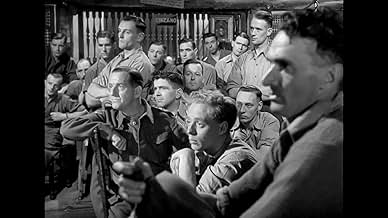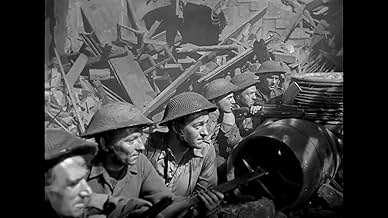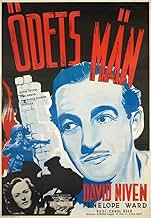VALUTAZIONE IMDb
6,9/10
2380
LA TUA VALUTAZIONE
Aggiungi una trama nella tua linguaWorld War II drama that follows a group of British draftees, starting with their rigorous basic training, and ending with their deployment in North Africa.World War II drama that follows a group of British draftees, starting with their rigorous basic training, and ending with their deployment in North Africa.World War II drama that follows a group of British draftees, starting with their rigorous basic training, and ending with their deployment in North Africa.
- Regia
- Sceneggiatura
- Star
- Premi
- 1 vittoria in totale
Hugh Burden
- Pte. Bill Parsons
- (as Hugh Burdon)
Jimmy Hanley
- Pte. Geoffrey Stainer
- (as Jimmie Hanley)
William Hartnell
- Sgt. Ned Fletcher
- (as Billy Hartnell)
A. Bromley Davenport
- Chelsea Pensioner
- (as Bromley Davenport)
Renée Asherson
- Marjorie Gillingham
- (as Renee Ascherson)
Recensioni in evidenza
This is a film about a seemingly run of the mill sort of group. After the Brits were involved in WWII and saw how bad the going would be, the government was forced to draft men who would traditionally have been exempt. Men who were a bit old or involved with careers that might be deemed 'useful' to the effort were suddenly being called to duty, as times were dire. The beginning of the film shows these men being selected for service.
Unfortunately, this is a rather motley group and they tended to complain quite a bit as well (mostly by Stanley Holloway's character). How they could become a productive unit seemed pretty doubtful and I doubt if such an unimpressive group of men would have been used as actors had this propaganda film been made a few years earlier--when things looked really bad for the British. However, now that the war was appearing win-able, I can understand the choices of actors.
There is nothing particularly magical about any of the film--their selection, their training or their combat experience in North Africa. However, all of it was very well handled and excelled because they tried to make it believable--normal, everyday men rising to the occasion. In many ways, it reminded me of a landlocked version of "In Which We Serve"--with fine acting and writing instead of jingoism and super-human exploits. Very well done.
There are a few interesting actors in the film. Peter Ustinov is in his first film and he plays a French-speaking man. While his French isn't 100% fluid, it was decent and a bit of a surprise. Apparently, he was in real life David Niven's assistant in the British Army and somehow ended up in the film--and thus began his career. Also, Dr. Who fans will appreciate that the Sergeant is played by Dr. #1, William Hartnell.
By the way, this is a little explanation for those who are not British or familiar with British history. Early in the film, someone asks Stanley Holloway's character who he liked in Parliament. Holloway indicates the only one he liked was Guy Fawkes! Fawkes was part of a plot to blow up Parliament in 1605, but was caught and executed--and the Brits celebrate this to this day with Guy Fawkes Day--as day of merry-making, bonfires and fireworks! Obviously Holloway's character wasn't exactly fond of the government, eh?!
Unfortunately, this is a rather motley group and they tended to complain quite a bit as well (mostly by Stanley Holloway's character). How they could become a productive unit seemed pretty doubtful and I doubt if such an unimpressive group of men would have been used as actors had this propaganda film been made a few years earlier--when things looked really bad for the British. However, now that the war was appearing win-able, I can understand the choices of actors.
There is nothing particularly magical about any of the film--their selection, their training or their combat experience in North Africa. However, all of it was very well handled and excelled because they tried to make it believable--normal, everyday men rising to the occasion. In many ways, it reminded me of a landlocked version of "In Which We Serve"--with fine acting and writing instead of jingoism and super-human exploits. Very well done.
There are a few interesting actors in the film. Peter Ustinov is in his first film and he plays a French-speaking man. While his French isn't 100% fluid, it was decent and a bit of a surprise. Apparently, he was in real life David Niven's assistant in the British Army and somehow ended up in the film--and thus began his career. Also, Dr. Who fans will appreciate that the Sergeant is played by Dr. #1, William Hartnell.
By the way, this is a little explanation for those who are not British or familiar with British history. Early in the film, someone asks Stanley Holloway's character who he liked in Parliament. Holloway indicates the only one he liked was Guy Fawkes! Fawkes was part of a plot to blow up Parliament in 1605, but was caught and executed--and the Brits celebrate this to this day with Guy Fawkes Day--as day of merry-making, bonfires and fireworks! Obviously Holloway's character wasn't exactly fond of the government, eh?!
(Minor Spoilers) One of the very best war movies to be made while WWII was still in progress with almost no hint of propaganda and false or movie-like heroism on the part of the good guys a squad,not battalion, of British Tommies in the North African desert. Released in London on June 6, 1944 D-Day, the film was released in the USA a year later as "The Immortal Battalion, "The Way Ahead" couldn't have come at a better time with the Allies and Nazis in a life and death struggle on the beaches of Normandy.
The movie starts off with a number of British recruits well into their 20's or even early 30's getting the hang of military life which at first they greatly, like their first sergeant Ned Fletcher(William Hertwell), dislike. As the trooper are whipped into shape by the though as nails Sgt. Fletcher and their commanding officer the soft spoken Let. Jim Perry, Davd Niven, their slated to sail to French North Africa to participate in the invasion, in Operation Torch, of Vichy France's colonies Algeria and Tunisia. As things turn out the troop ship that their in gets struck by a German U-boat torpedo and sinks, with half the battalion lost, in the Mediterranean Sea.
With Let.Perry's unite now reduced to company size it's sent to Gibraltar for what seems like the remainder of the war. It's not until the battle of El Alamein starts to turn against the British Eight Army that Let. Perry's men are immediately sent to the front lines to stop the German Afrika's Corps advance. We , as well as Perry's men, finally get to see action as Let. Perry's men are outflanked and cut off by the advancing German troops as the battle of El Alamein rages on behind their backs.
Fghting for their very lives and almost out of ammunition the trapped and outnumbered British troops at the end of the movie tack on their bayonets and walk out of the safety of their barricaded and fixed position, the Rispoli Café, to confront the heavily armed Germans. And at the same time walk into the pages of history in both courage and valor under fire.
You just can't keep from holding back your tears in watching the movie knowing that almost all the cast will eventually end up killed or captured. The movie both didn't overemphasize the British Troops as well as downplay Rommell's Africa Corps. Both parties came across equally brave and effective in the fighting that takes pace in the film. Which is very rare in war movies were one side, the one who makes the film, is shown vastly superior morally as well as militarily over the other: The one that the side who made the movie is at war with.
P.S Look for both Actor Peter Ustinov as café owner Rispoli and Trevor Howard as the troop ships, that goes under the waves, officer in the movie.
The movie starts off with a number of British recruits well into their 20's or even early 30's getting the hang of military life which at first they greatly, like their first sergeant Ned Fletcher(William Hertwell), dislike. As the trooper are whipped into shape by the though as nails Sgt. Fletcher and their commanding officer the soft spoken Let. Jim Perry, Davd Niven, their slated to sail to French North Africa to participate in the invasion, in Operation Torch, of Vichy France's colonies Algeria and Tunisia. As things turn out the troop ship that their in gets struck by a German U-boat torpedo and sinks, with half the battalion lost, in the Mediterranean Sea.
With Let.Perry's unite now reduced to company size it's sent to Gibraltar for what seems like the remainder of the war. It's not until the battle of El Alamein starts to turn against the British Eight Army that Let. Perry's men are immediately sent to the front lines to stop the German Afrika's Corps advance. We , as well as Perry's men, finally get to see action as Let. Perry's men are outflanked and cut off by the advancing German troops as the battle of El Alamein rages on behind their backs.
Fghting for their very lives and almost out of ammunition the trapped and outnumbered British troops at the end of the movie tack on their bayonets and walk out of the safety of their barricaded and fixed position, the Rispoli Café, to confront the heavily armed Germans. And at the same time walk into the pages of history in both courage and valor under fire.
You just can't keep from holding back your tears in watching the movie knowing that almost all the cast will eventually end up killed or captured. The movie both didn't overemphasize the British Troops as well as downplay Rommell's Africa Corps. Both parties came across equally brave and effective in the fighting that takes pace in the film. Which is very rare in war movies were one side, the one who makes the film, is shown vastly superior morally as well as militarily over the other: The one that the side who made the movie is at war with.
P.S Look for both Actor Peter Ustinov as café owner Rispoli and Trevor Howard as the troop ships, that goes under the waves, officer in the movie.
A film that despite being made in 1944, avoids sterotyping British Characters. A story about a group of people, from various civilian jobs, who receive their call-up papers. It shows them progressing through their training and entering action in North Africa.
THE WAY AHEAD is to some extent a cliche-driven movie, but given the timeframe of its production, I feel it portrays very well the mindset of the ordinary citizen of a country under extreme duress, as well as the tribulations of the many regiments being reconstituted as the war progressed seemingly forever. While it is difficult for us to imagine what it must have been like to live under the constant spectre of loss and possible defeat, even some understanding of the way things were for the British in 1944 will permit a casual viewer of THE WAY AHEAD to appreciate its positive message and the call-to-duty which it implies.
When compared against many of the similar American WW2 'propaganda' films, THE WAY AHEAD comes across as a down-to-earth story which I'm sure many could identify with at the time. For us, the 21st-century viewer, this movie is a welcome glimpse of the British perspective back then, unique in both plot and characterization compared to the more common U.S. fare of the period. In addition, it provides the enthusiast with dozens of rare snapshots of the use of unique British Commonwealth WW2 equipment.
When compared against many of the similar American WW2 'propaganda' films, THE WAY AHEAD comes across as a down-to-earth story which I'm sure many could identify with at the time. For us, the 21st-century viewer, this movie is a welcome glimpse of the British perspective back then, unique in both plot and characterization compared to the more common U.S. fare of the period. In addition, it provides the enthusiast with dozens of rare snapshots of the use of unique British Commonwealth WW2 equipment.
This is a good film that was intended to bolster morale during World War II. The cast is very good and headed by David Niven. This is a story primarily of 8 men of different backgrounds who survive their basic training and end up driving Rommel out of North Africa. The film is primarily about how men develop character when push comes to shove and there isn't a whole lot of action. Good story and worth seeing for the strong cast alone.
Lo sapevi?
- QuizIn the U.K., this was released on D-Day, June 6, 1944.
- BlooperFollowing some energetic army training, Private Bill Parsons is seen sitting on the grass at the top of a cliff, with his colleagues, exhausted. However, the action then cuts to him being helped up the cliff.
- Citazioni
Pvt. Ted Brewer: Only one good man ever got into Parliament.
Pvt. Herbert Davenport: Oh really? Who?
Pvt. Ted Brewer: Bleedin' Guy Fawkes.
- Curiosità sui creditiThe film ends with THE BEGINNING
- Versioni alternativeThe version seen on American TV under the alternate title "The Immortal Battalion" has been re-edited and extensively cut (from 115 to 91 or 86 minutes) by Ed Fitz with an added preface and epilogue by war correspondent Quentin Reynolds.
- ConnessioniEdited into WW II Theater: The Way Ahead (2022)
- Colonne sonoreIf You Were the Only Girl (in the World)
(uncredited)
Written by Nat Ayer
Lyrics by Clifford Grey
Performed by Tessie O'Shea and soldiers
I più visti
Accedi per valutare e creare un elenco di titoli salvati per ottenere consigli personalizzati
- How long is The Way Ahead?Powered by Alexa
Dettagli
- Tempo di esecuzione
- 1h 55min(115 min)
- Colore
- Proporzioni
- 1.37 : 1
Contribuisci a questa pagina
Suggerisci una modifica o aggiungi i contenuti mancanti



































